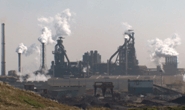Market Segment

September 13, 2020
U.S. Out Front in Decarbonization Debate
Written by Sandy Williams
The global steel industry is one of the biggest culprits in the climate change debate, responsible for some 7 percent of harmful carbon dioxide emissions each year. Every ton of steel produced in 2018 released 1.85 tons of carbon into the atmosphere. Thus the steel industry is under enormous pressure to reduce its carbon footprint. Fortunately, U.S. steel producers are among the most CO2 efficient in the world, said CRU Analyst Ryan Smith in his remarks during the SMU Virtual Steel Summit last month.
The trend toward electric arc furnace production has driven decarbonization in the U.S. “The amount of CO2 a facility emits, and the CO2 intensity of the steel produced, is directly proportional to the amount of carbon that enters a facility,” wrote Smith in a recent article. “One hundred percent scrap-based EAFs produce steel with the lowest CO2 intensity as the carbon inputs are mostly in the form of graphite electrodes, natural gas and small quantities of injection coal for slag foaming.”
As the proportion of metallics containing carbon increases, so does the CO2 intensity. DRI and HBI are produced to have lower levels of carbon and impurities, which reduces carbon emissions.
Carbon in the form of coal and coke are the primary contributors to CO2 emissions in BF-BOF steelmaking. U.S. blast furnace producers are setting intensity standards globally by using reductants like natural gas and hydrogen, Smith said.
The European Union is considered the most developed market in terms of carbon initiatives, utilizing carbon pricing to incentivize lowering CO2 emissions in industrial production. Under consideration is an EU carbon border tariff adjustment on imports, such as steel, that have not paid a carbon price in their country of origin.
U.S.-produced steel is already less CO2 intensive relative to imports. If a carbon border tariff adjustment were instituted by the U.S., it would increase domestic competitiveness, raising the cost of imports by about $30 per ton, Smith estimates.
If CO2 carbon pricing were applied globally, the U.S. would again benefit. Pricing much higher than $50 per ton would be required, however, to truly incentivize a “wholesale transition to low carbon steelmaking technology,” said Smith.
The idea of a carbon border tariff adjustment has received considerable pushback, with some calling it a protectionist trade measure that would punish developing countries. Others see it as a way of ensuring fair play.
University of California Economist Alan Auerbach is one proponent. “Unlike tariffs on imports or subsidies for exports, border adjustments are not trade policy. Instead, they are paired and equal adjustments that create a level tax playing field for domestic and overseas competition.”







